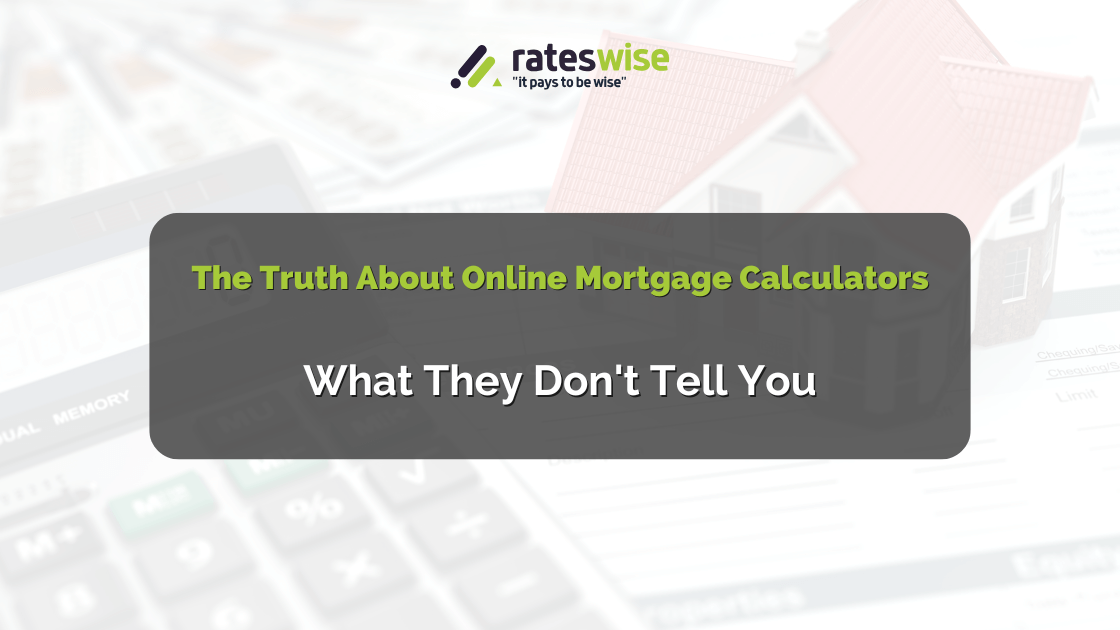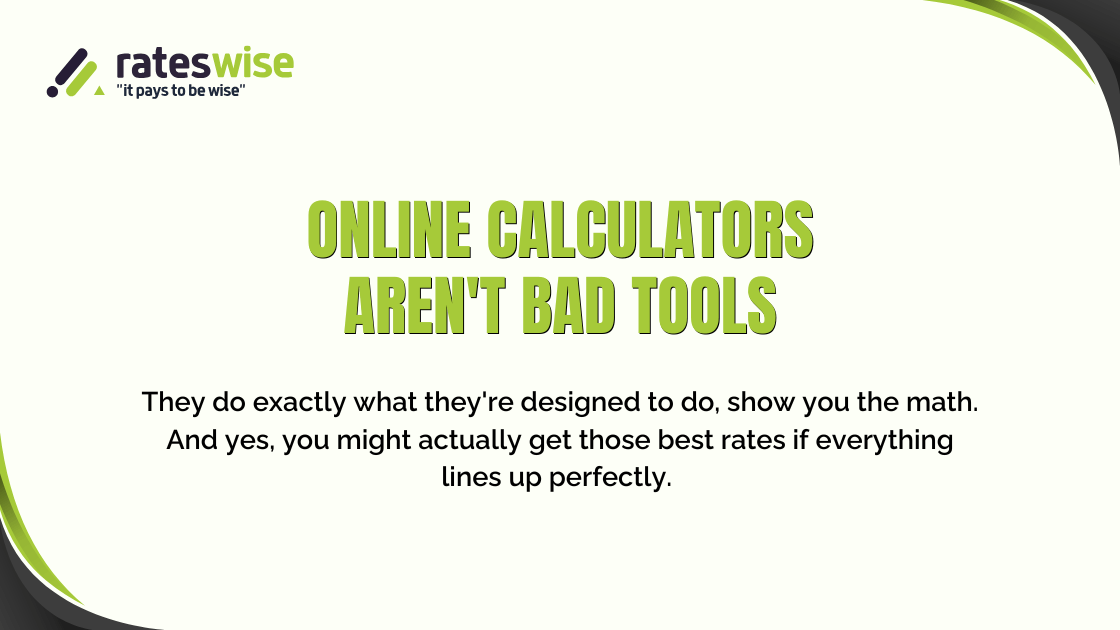The Truth About Online Mortgage Calculators: What They Don't Tell You

Updated August 2025
Are you thinking about refinancing or looking for a new home? You've probably used online mortgage calculators. These tools are everywhere and seem really helpful. Just enter some numbers and get your monthly payment, right?
But here's what most people don't know: these calculators can't give you the full picture. They're a good start, but they miss a lot of important stuff that affects your real mortgage rate.
Most online calculators in Canada only provide rough estimates, ignoring important variables like property taxes, lender-specific regulations, and your credit score. This may lead to unrealistic expectations or bad mortgage choices. Let's examine the true functions, limitations, and how you can use them in 2025.
Why Online Mortgage Calculators Are So Popular
An Ontario mortgage payment calculator is super easy to use. You type in how much you want to borrow, pick an interest rate, and boom - you get your monthly payment. An Ontario mortgage affordability calculator tells you how expensive a house you can buy based on your income.
These tools made mortgage shopping much easier. Anyone can use them from home without talking to a bank first. That's pretty cool.
But here's the problem: real mortgages are way more complicated than what these simple calculators can handle.
The Big Problem: "Conditions Apply"
Ever notice those tiny words at the bottom of mortgage ads? "Conditions apply" or "rates subject to approval." Those three little words are huge.
You're looking at the best possible rate when you search Ontario mortgage rates online. This rate is only for people with good credit, steady jobs, and lots of money for a down payment. Most regular people don't get these rates.
Don't get me wrong - online calculators aren't bad tools. They do exactly what they're designed to do: show you the math. And yes, you might actually get those best rates if everything lines up perfectly. Some lenders do offer their best advertised rates to qualified borrowers.
But here's what determines whether you get those best numbers or something higher:
- Your credit story - Not just your score, but how you've managed credit over time, recent inquiries, and any past payment failures.
- Employment stability - How long you've been in your job, whether your income goes up and down, and if you're switching careers
- Down payment source - Where your money comes from matters just as much as how much you have
- Debt picture - Your monthly obligations, not just credit cards but car payments, student loans, even child support
The calculators can't ask about these personal details, so they assume everything's perfect. Real life is usually more complicated.

Your Job and Income Matter Way More Than You Think
Here's something most Ontario home loan calculators don't ask about: how you make your money.
Getting paid a salary is different from earning commissions. Being self-employed is different from working for someone else. Having the same job for ten years is different from starting a new job last month.
Banks care about all of this stuff - A lot.
Let's say two people both make $80,000 a year. One person gets a steady paycheck from the government. The other person owns a small business. The bank will treat these two people very differently, even though they make the same money.
The business owner might need to show two years of tax returns. They might get a higher interest rate. They might need to put more money down. But a simple calculator treats both people exactly the same.
Different Types of Income Get Different Treatment
Banks are picky about where your money comes from:
- Regular salary vs. commission pay
- Employee vs. business owner
- Money earned in Canada vs. money from another country
- New job vs. long-time job
- Main job vs. side jobs
Each type gets handled differently by the bank. But online calculators don't know the difference.
Down Payments Are More Complicated Than They Look
An Ontario mortgage down payment calculator might tell you that you need 5% down. Sounds simple, right? But it's not.
If you put down less than 20%, you have to buy mortgage insurance. This costs extra money every month. Plus, you need cash for lawyers, home inspections, and moving costs. And you should have some money left over after buying your house.
Also, banks care where your down payment money comes from. Is it a gift from your parents? Money from selling stocks? Your savings? Each source has different rules.
What Calculators Can't Tell You About Your Situation
An Ontario mortgage amortization calculator can show you different payment schedules. But it can't tell you which one is best for your life.
Should you pay off your mortgage in 25 years or 30 years? Depends on your plans. Are you planning to have kids? Change jobs? Start a business? These personal things matter, but calculators can't help with them.
Same thing with an Ontario mortgage interest calculator. It shows you the math, but it can't explain things like rate holds, penalties, or special features that might be important for you.
The Pre-Approval Reality Check
Many people use an Ontario mortgage pre-approval calculator and think they're done. But real pre-approval is different.
A real pre-approval means a lender looks at your actual pay stubs, bank statements, and credit report. They check your job history and debt payments. This gives you a much better idea of what you can actually afford.
Online calculators skip all of this important stuff.

How to Use Calculators the Right Way
Don't throw away those online tools completely. They're actually pretty useful when you use them right.
Use an Ontario mortgage affordability calculator to get a rough idea of your budget. Try different scenarios with payment calculators. Play around with down payment amounts.
But remember: these are just starting points. The real answers come from talking to mortgage experts who can look at your whole financial picture.
What Banks Actually Look At
When you apply for a mortgage, banks dig deep. What they're looking for is:
- How long have you held your present position?
- Whether your income is stable or goes up and down
- All your monthly bills and debts
- Your credit score and payment history
- Where your down payment money come from
- How much money do you have left after buying the house
No online calculator asks about all of this stuff. However, it all has an impact on your approval and rate.

The Bottom Line
Online mortgage calculators are great for getting started. They help you understand basic costs and do some planning. But they can't replace talking to real mortgage professionals.
Think of calculators like weather apps. They give you a general idea, but if you're planning something important, you want more detailed information.
Use the tools, but don't make big decisions based only on what they tell you. Your mortgage is probably the biggest loan you'll ever get. Before you sign anything, be sure you understand every detail.
You can make the best decision if you consider both expert advice and online research. Start with calculators, but finish with professionals who understand your specific situation.
FAQs
Are Canadian online mortgage calculators reliable?
Although calculators are good for estimates, they do not consider important information, including taxes, CMHC fees, and your true credit profile. Always get a second opinion from a local mortgage broker.
How does a pre-approval vary from a mortgage calculator?
Calculators are just estimates. While in the pre-approval process, your lender will analyse your debt, income, and credit to provide an accurate rate.
Why do the calculator and my mortgage payment differ?
Because calculators sometimes exclude local taxes, insurance, and lender-specific rates. Depending on your profile, your actual rate may be greater or lower.
Is it possible to compare fixed and variable rates using mortgage calculators?
Usually not. Most calculators do not account for rate changes, inflation, or interest rate increases as market rate changes. So it's better to speak with an expert or use dynamic tools.
Which Canadian mortgage calculator is the best?
Use calculators that involve credit input, regional taxes, and CMHC calculations.
Disclaimer
The information provided in this article is for general informational purposes only and is not intended as financial, legal, or professional advice. While Rateswise aims to provide accurate and up-to-date information, mortgage calculations, rates, and lending policies may vary based on your financial profile, lender requirements, and market conditions. Always consult with a licensed mortgage professional or financial advisor before making any decisions related to mortgage products or financing options.
About the Author
Written by
Mortgage Content Strategist @ Rateswise
I assist Canadian homeowners in navigating the complicated mortgage market and determining how to secure the best mortgage rate.